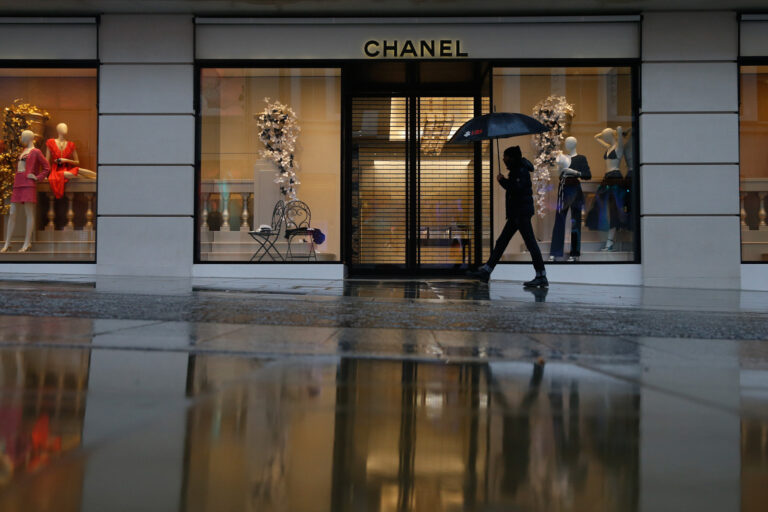More consumers are severing ties with brands for ethical reasons
Photo: Holly Adams/Getty Images
As Israel’s attacks on Gaza continue, a growing number of people are showing their opposition in a tried-and-true way: refusing to buy Israeli-linked products. A survey of my Instagram followers revealed that 99% are boycotting brands with strong ties to Israel, from Pampers to Puma.
When it comes to fashion, many are cutting off brands that have made statements in support of the state of Israel, including American Eagle, Tory Burch and Donna Karan. Marks & Spencer also sparked outrage in November when it posted a holiday ad on Instagram that featured an image of a burning paper hat in the colors of the Palestinian flag.
Wealthy customers are also cutting ties with luxury brands. Fashion brands such as Chanel, Givenchy, Louis Vuitton, Tommy Hilfiger, Ralph Lauren and Michael Kors have either publicly voiced support for Israel or have financial ties to the country, according to theislamicinformation.com, a website that offers an online tool to track brand affiliations with Israel.
Boycotting brands is an effective way for consumers to take action and is inspired by their personal “morality”, says Emily Abrahams, co-founder of Love Luxury, Britain’s largest retailer of second-hand Chanel, Hermes and Rolex products.
“I think for many years the Western media has been very propaganda-driven when it comes to Israel,” she says. “Now we’re actually seeing live footage and people are thinking, ‘Wait a second, this isn’t OK. I don’t want to pay money to support this.'”
Boycotts have been highly successful in recent years: From 2020 to 2022, animal rights group PETA urged consumers to turn their backs on House of Fraser over its sale of animal fur; the retail chain opted to stop selling it in 2023. In 2021, under pressure from customers, jewellery and watch maker Harry Winston decided to stop using rubies from Myanmar, a country that has long persecuted the Rohingya Muslim minority.
While decades-old brands may be able to bounce back from a boycott, it’s not so easy for lesser-known brands. Shortly after the October 7 Israeli attacks, Dorit Bar-Our, founder of Tel Aviv-based fashion brand Dodo Bar-Our, posted a video on Instagram equating Hamas with ISIS. Online retailers Net-a-Porter and Mytheresa quickly removed the brand from their websites. Although the brand has since been reinstated, the brand’s and Bar-Our’s own reputations have been irreparably damaged, leading some pro-Palestinian consumers to boycott e-commerce sites that stock the brand.
More established luxury fashion brands are also facing increased scrutiny. In early November, several social media users called for a boycott of Dior after rumors circulated that the brand had replaced Palestinian-Dutch model Bella Hadid as an ambassador with Israeli model May Tager after she voiced support for the people of Gaza. However, it was later revealed that Hadid’s contract had ended before the October 7 attacks.
But Chanel’s story is quite different: In mid-October, a leaked letter co-authored by Global Executive Chairman Alan Wertheimer said the fashion house would donate $4 million in aid to Israel.
Lily, a 34-year-old Muslim web designer from Mumbai, started buying Chanel in 2019 and owns more than 10 pieces from the brand, including bags, shoes and jewelry. A few months ago, she was among the guests when Chanel hosted a dinner for VIP clients in India. But the brand’s support for Israel has made her see Chanel in a new light.
“Chanel was definitely my favorite luxury brand, but as a new mom, seeing the photos and videos coming out of Gaza just doesn’t convince me to spend my money there anymore,” she said, adding that she will never buy Chanel products again unless the fashion house publicly changes its neutral stance or donates to victims in Gaza.
“I don’t plan on using my Chanel purchases right now, but I’m not going to throw them away just yet. This is hard-earned money and I don’t want to make impulse purchases,” says Lily, who is also open to buying on the second-hand market, where the money doesn’t go directly to the brand.
Whether permanent or temporary, boycotts are more than just a passing activist fad, especially among younger consumers: And with millennials and Gen Z predicted to account for 70% of the luxury market by 2025, according to a Bain & Company study, brands would be wise to pay attention to the ethical concerns of this growing market segment.
Luxury fashion lovers like Lily may brag on social media about photos of orange Hermes boxes, crystal-encrusted Prada bags, and Chanel chain straps, but she’s not the kind of buyer who blindly responds to brand identity. Lily stopped shopping at Balenciaga after the controversy over its ad campaign featuring bondage-clad teddy bears. She also distanced herself from Dior after creative director Maria Grazia Chiuri attended a White House dinner honoring Indian Prime Minister Narendra Modi. She says India’s Hindu nationalist government is prejudiced against Indian Muslims.
“I don’t know if boycotting Chanel would make any difference,” she said, “but I cannot in good conscience support a brand that supports the apartheid regime.”
topic
Subscribe to Hyphen weekly
Subscribe to Hyphen’s weekly roundup for insightful reporting, commentary and the latest arts and lifestyle coverage from across the UK and Europe.


